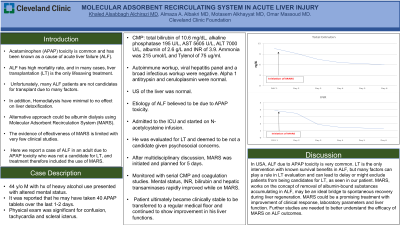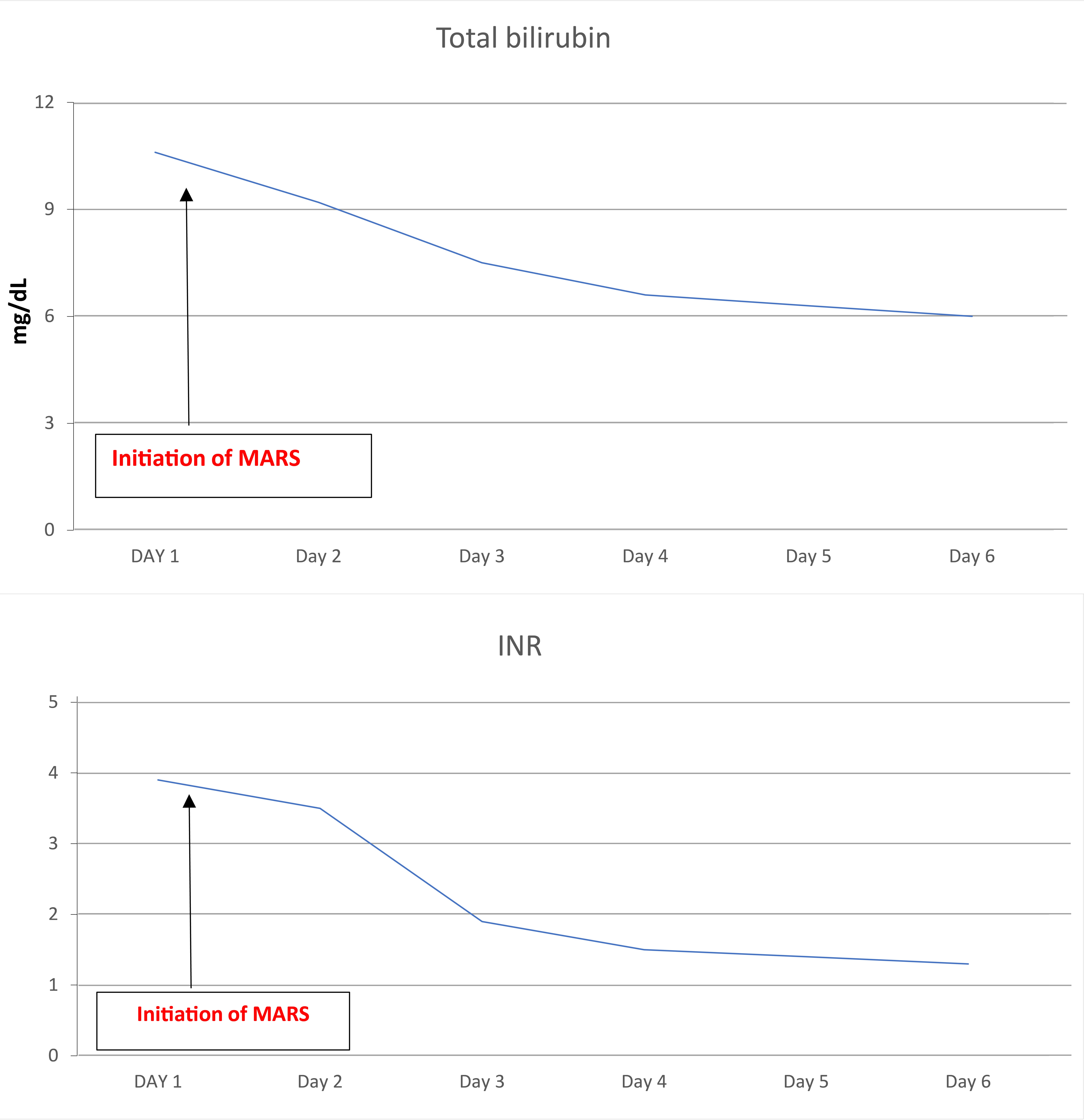Back


Poster Session A - Sunday Afternoon
Category: Liver
A0549 - Molecular Adsorbent Recirculating System in Acute Liver Injury
Sunday, October 23, 2022
5:00 PM – 7:00 PM ET
Location: Crown Ballroom

Has Audio
.jpg)
Khaled Alsabbagh Alchirazi, MD
Cleveland Clinic
Cleveland, OH
Presenting Author(s)
Khaled Alsabbagh Alchirazi, MD1, Almaza A. Albakri, MD2, Motasem Alkhayyat, MD3, Omar Massoud, MD1
1Cleveland Clinic, Cleveland, OH; 2Royal Jordanian Medical Services, Amman, Al Karak, Jordan; 3Cleveland Clinic Foundation, Cleveland, OH
Introduction: Acetaminophen (APAP) toxicity is common and has been known as a cause of acute liver failure (ALF). ALF has high mortality rate, and in many cases, liver transplantation (LT) is the only lifesaving treatment. Unfortunately, many ALF patients are not candidates for transplant due to many factors. In addition, Hemodialysis have minimal to no effect on liver detoxification. Alternative approach could be albumin dialysis using Molecular Adsorbent Recirculation System (MARS). The evidence of effectiveness of MARS is limited with very few clinical studies. Here we report a case of ALF in an adult due to APAP toxicity who was not a candidate for LT, and treatment therefore included the use of MARS.
Case Description/Methods: A 44 y/o M with hx of heavy alcohol use presented with altered mental status. It was reported that he may have taken 40 APAP tablets over the last 1-2 days. Physical exam was significant for confusion, tachycardia and scleral icterus. CMP: total bilirubin of 10.6 mg/dL, alkaline phosphatase 195 U/L, AST 5605 U/L, ALT 7000 U/L, albumin of 2.6 g/L and INR of 3.9. Ammonia was 215 umol/L and Tylenol of 75 ug/ml. Autoimmune workup, viral hepatitis panel and a broad infectious workup were negative. Alpha 1 antitrypsin and ceruloplasmin were normal. US of the liver was normal. Etiology of ALF believed to be due to APAP toxicity. He was admitted to the ICU and started on N-acetylcysteine infusion. He was evaluated for LT and deemed to be not a candidate given psychosocial concerns. After multidisciplinary discussion, MARS was initiated and planned for 5 days. The patient was monitored with serial CMP and coagulation studies. Mental status, INR, bilirubin and hepatic transaminases rapidly improved while on MARS. Patient ultimately became clinically stable to be transferred to a regular medical floor and continued to show improvement in his liver functions.
Discussion: In USA, ALF due to APAP toxicity is very common. LT is the only intervention with known survival benefits in ALF, but many factors can play a rule in LT evaluation and can lead to delay or might exclude patients from being candidates for LT, as seen in our patient. MARS, works on the concept of removal of albumin-bound substances accumulating in ALF, may be an ideal bridge to spontaneous recovery during liver regeneration. MARS could be a promising treatment with improvement of clinical response, laboratory parameters and liver function. Further studies are needed to better understand the efficacy of MARS on ALF outcomes.

Disclosures:
Khaled Alsabbagh Alchirazi, MD1, Almaza A. Albakri, MD2, Motasem Alkhayyat, MD3, Omar Massoud, MD1. A0549 - Molecular Adsorbent Recirculating System in Acute Liver Injury, ACG 2022 Annual Scientific Meeting Abstracts. Charlotte, NC: American College of Gastroenterology.
1Cleveland Clinic, Cleveland, OH; 2Royal Jordanian Medical Services, Amman, Al Karak, Jordan; 3Cleveland Clinic Foundation, Cleveland, OH
Introduction: Acetaminophen (APAP) toxicity is common and has been known as a cause of acute liver failure (ALF). ALF has high mortality rate, and in many cases, liver transplantation (LT) is the only lifesaving treatment. Unfortunately, many ALF patients are not candidates for transplant due to many factors. In addition, Hemodialysis have minimal to no effect on liver detoxification. Alternative approach could be albumin dialysis using Molecular Adsorbent Recirculation System (MARS). The evidence of effectiveness of MARS is limited with very few clinical studies. Here we report a case of ALF in an adult due to APAP toxicity who was not a candidate for LT, and treatment therefore included the use of MARS.
Case Description/Methods: A 44 y/o M with hx of heavy alcohol use presented with altered mental status. It was reported that he may have taken 40 APAP tablets over the last 1-2 days. Physical exam was significant for confusion, tachycardia and scleral icterus. CMP: total bilirubin of 10.6 mg/dL, alkaline phosphatase 195 U/L, AST 5605 U/L, ALT 7000 U/L, albumin of 2.6 g/L and INR of 3.9. Ammonia was 215 umol/L and Tylenol of 75 ug/ml. Autoimmune workup, viral hepatitis panel and a broad infectious workup were negative. Alpha 1 antitrypsin and ceruloplasmin were normal. US of the liver was normal. Etiology of ALF believed to be due to APAP toxicity. He was admitted to the ICU and started on N-acetylcysteine infusion. He was evaluated for LT and deemed to be not a candidate given psychosocial concerns. After multidisciplinary discussion, MARS was initiated and planned for 5 days. The patient was monitored with serial CMP and coagulation studies. Mental status, INR, bilirubin and hepatic transaminases rapidly improved while on MARS. Patient ultimately became clinically stable to be transferred to a regular medical floor and continued to show improvement in his liver functions.
Discussion: In USA, ALF due to APAP toxicity is very common. LT is the only intervention with known survival benefits in ALF, but many factors can play a rule in LT evaluation and can lead to delay or might exclude patients from being candidates for LT, as seen in our patient. MARS, works on the concept of removal of albumin-bound substances accumulating in ALF, may be an ideal bridge to spontaneous recovery during liver regeneration. MARS could be a promising treatment with improvement of clinical response, laboratory parameters and liver function. Further studies are needed to better understand the efficacy of MARS on ALF outcomes.

Figure: Total Bilirubin and INR levels before, during and after MARS treatment in a patient with Acute Liver Failure. The arrows indicate the first treatment session.
Disclosures:
Khaled Alsabbagh Alchirazi indicated no relevant financial relationships.
Almaza Albakri indicated no relevant financial relationships.
Motasem Alkhayyat indicated no relevant financial relationships.
Omar Massoud indicated no relevant financial relationships.
Khaled Alsabbagh Alchirazi, MD1, Almaza A. Albakri, MD2, Motasem Alkhayyat, MD3, Omar Massoud, MD1. A0549 - Molecular Adsorbent Recirculating System in Acute Liver Injury, ACG 2022 Annual Scientific Meeting Abstracts. Charlotte, NC: American College of Gastroenterology.
